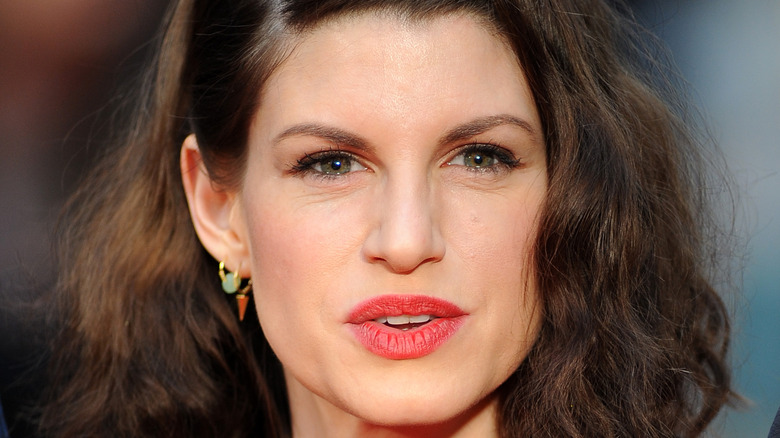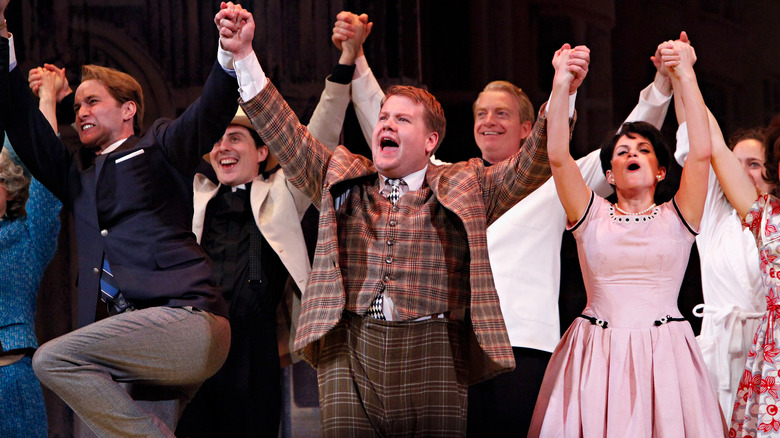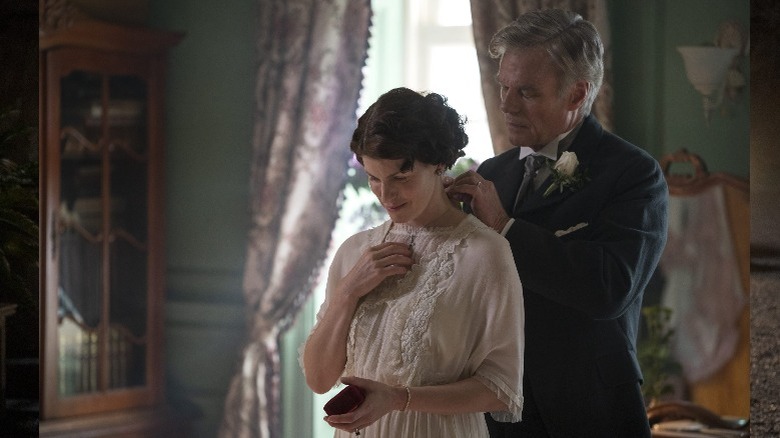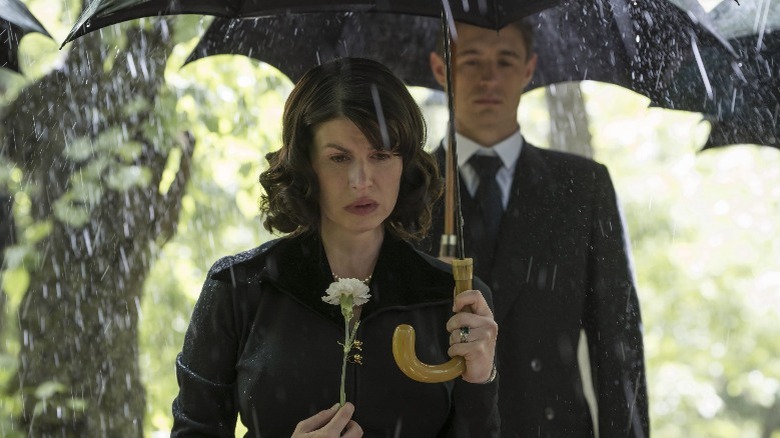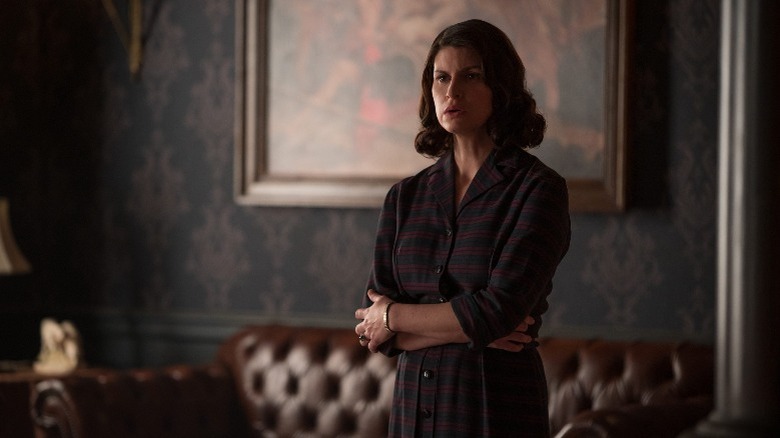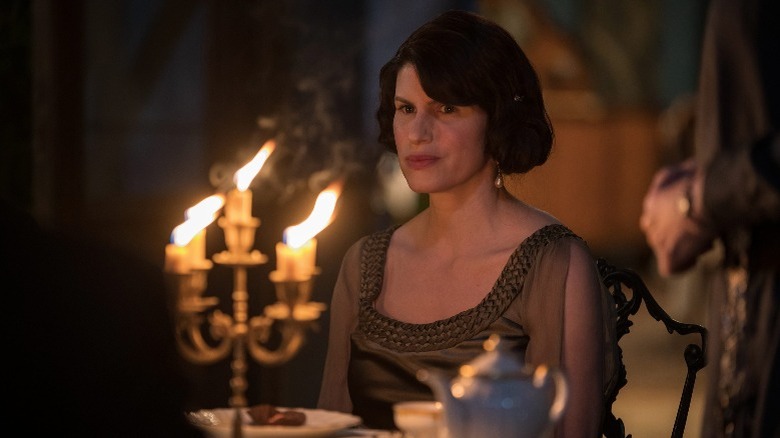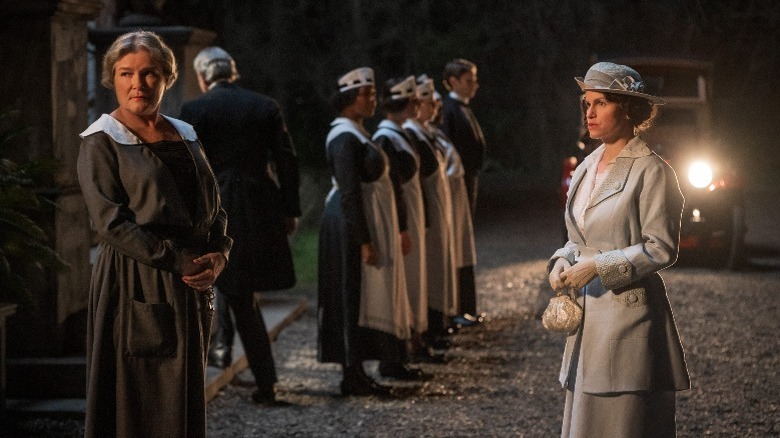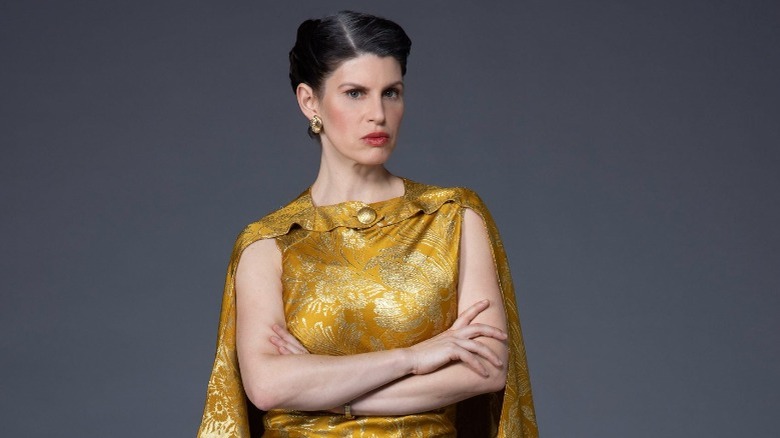Jemima Rooper On Flowers In The Attic: The Origin And Gothic Horror - Exclusive Interview
Jemima Rooper has been appearing in British film and television projects since childhood, and will make her Lifetime debut as Olivia Winfield in the new mini-series "Flowers in the Attic: The Origin." Featuring Rooper opposite Max Irons, the series also includes "The Vampire Diaries" actor Paul Wesley, and veteran actors Kesley Grammer and Kate Mulgrew. "Flowers in the Attic: The Origin" retells the source material's disturbing narrative through four film-length episodes.
In an exclusive interview with The List, the actress dished on the twists and turns of the new series, and how V.C. Andrews' original novels have been adapted into an absorbing new narrative. Jemima Rooper gave The List an inside perspective on playing the series' controversial matriarch throughout her life. The actress also gave viewers hints about what they can look forward to as the series progresses, teasing some of its suspenseful payoffs that we can expect from future episodes.
The actress honed her technique on stage
You got your start in film and television, but you also have a background in the London theater scene. What has it been like to transition between the stage and film and television projects?
Interesting question. I started off as a kid in kids' television, and that was all I really knew, but I'd always loved being in plays outside school, and in particular, musicals. I went the TV route and it was very interesting as I was 18 and on the cusp of maybe going to study [in] drama school. It became quite obvious that theater was a closed shop. You get quite pigeonholed, and for a long time I did a few small plays with directors who gave me a chance.
It wasn't until my mid-20s ...There was a new play on the National Theater and they were struggling to find this one actor for this part. They'd seen a lot of people, and then I got an audition because they'd literally seen everyone else. I walked in and it was a great fit. It was the most amazing character, the most amazing play, and I really connected with it.
That changed everything. That suddenly meant people assumed I'd trained at RADA [London's Royal Academy of Dramatic Art], which I hadn't. I would've loved to. It completely steered my career off in a different direction. Consequently, you get older, I have a great face for radio, and TV and film then went a bit quieter. It depends what's out there and it goes up and down, but I love being able to do all of it if I can, because the mediums are all brilliant in their own way. I have a very affectionate love for a TV set that will never go away because I was 13 and it was magic to me. There's nothing like a live theater and being with a gang of other actors and being all together.
Flowers in the Attic: The Origin will tell a new version of a familiar story
I want to come back to asking you about fit in projects later, but that sounds like a really logical development and wonderful communities to be a part of. Talking about "Flowers in the Attic," it's based off of the book series by V.C. Andrews, and this project begins with the last novel, which is a prequel. Did you have familiarity with the source material or had you watched any of the other film adaptations of the series?
No, I hadn't. I recognized the name so well. I remember when I first got the information through in the scripts, but I couldn't think what the story was. I looked it up on the internet and read a very short breakdown of "Flowers in the Attic" and went, "Wow, that's a really nasty story." Then I read the scripts and they are so brilliant and you've got four 90-minute episodes that chart this woman from age 30 to age mid-60s, or whatever — this life that unfolds, and these horrific things she has to navigate, and these things she survives, and suddenly you are where you thought you were going to hate this woman, and how are you going to watch this monster for hours and hours? Suddenly, you are relating to her and on her side and rooting for her. That was incredible.
I then read "Flowers in the Attic" just before I started filming, to see if there're any clues or reasons why she ends up [how she does]. I kept thinking, "Oh God, we haven't done that," or there were little details that I felt like, "Is this bad that we are not doing it quite like this?" I squared it with myself that "Flowers in the Attic" is very much Cathy's voice, and a young girl's opinion of this woman, where you fill in the gaps of what you think this person is and their perception of them. What I thought was so interesting was the prequel fills in the 80% that we don't ever see in "Flowers in the Attic." That was really intriguing.
The series' darker themes have major payoff
I didn't think about the discrepancy between the narrator in the book series, because you're the protagonist in your series. What drew you to Olivia Winfield and what was the process like as you prepared to play her? You read the book, but did you have any nerves or apprehension about the darker themes in the story?
I plowed through the scripts like nothing else, which is actually how everyone reads the books. They are page turners, and there is something that sucks you in. There's this incredible alchemy between — we don't have this genre, really, in the UK. It's a very unique — it's described as American Gothic Horror, or American Family Saga Horror, and it's brilliant. There's something that grabs you like nothing else. Despite the dark and controversial storylines that should make you feel awful and horrible and not at all be entertaining, for some reason, the style of it allows you to enjoy it.
There's this wink, or ... It is really fun. As our series progresses, we were all very ... The first episode was a lot more serious. It was a lot darker, but it was necessary to have that because the payoff comes later, if you're invested with these characters. You need the roots of truth to invest in these characters. It gets so fun and wicked and ridiculous in so many ways, but it means that you fly with it and it's so entertaining and it's so enjoyable. It's weirdly escapist.
The cast worked together to perfect their accents
I wanted to know what your process was like with the American accent for "Flowers in the Attic." Would you look for other roles that had dialogue coaching involved, or is that something that you are less comfortable with?
No, it's really interesting. In the UK, we're really used to doing accents. I prefer having an accent to do rather than speaking my own voice. I'm always a bit — there are certain actors who really love being themselves and love showing off, and I'm not like that. I like to be someone else. If I'm too much like me, I feel really uncomfortable. There was something — Paul Sciarrotta, the writer and showrunner, I don't know what it was about his writing, something clicked.
I definitely had to do some work. It wasn't, by any means, all there, but there was something about the period [that helps with] this slight English intonation or this influence on it. It's not like modern American, which sometimes takes a little longer to tune into, but there's something about the dialogue, [and] the words he used. It wasn't too much of a hard slog for me, which was good because there wasn't time for that.
We also worked with an amazing dialect coach. This English woman, Penny Dyer, and Max [Irons] helped bring her onto it, which was great, because then she would do us all. It's so fascinating. I remember the first hour I wanted her to talk about stuff because it's all to do with history, and geography, and it is fascinating how accents evolve, and why they are the way they are and where they've come from. I first worked with her when I was 16, and I remember having to do a west country accent in the UK, and she talked about the soil. She's like, "It's like clay, and it's red, and that's why people shape their words the way they do." It's fascinating. It's brilliant. Love it.
I would never have thought of the actual occupational effect on the voice. Is it a unique challenge to do other dialects from the UK over American accents, because it's such a specific switch or is it more accessible?
I feel like American's probably more accessible than some of the more niche UK accents. There's so many, and often I probably can do accents, that's very broad ... but [regarding] American, we all grow up watching American movies and American television. There's something about it that is in us, in our ear from a young age. It always feels nicely familiar.
Jemima Rooper gave a sneak peak into the series' timeline
I want to know if there are other things that you'd like to share that you'd like viewers to know before they go into this series.
I'd like viewers to know that it won't all be me. I'm being really forward. Each episode has its own vibe, and that's what is brilliant about it and unique. The first one is darker and spookier and graver, and then the second one, you get the kids coming into it, and the period changes. You're suddenly in the 1940s and you get a whole new load of characters and their lives. [You'll see] characters, well known characters like Corrine, and then lesser known characters.
There's some storylines that are not in the books that are in our series that really expand the scope of it in loads of ways. There's some incredible well-known actors in the show, but there are also some actors who, [for] a few, it's some of their first jobs, and they're all impeccable and incredible. It's very exciting that they're a new generation coming up. I hope people stick around to see what happens.
The set was an acting masterclass
There are so many familiar faces in the cast. Was there anyone you were particularly excited to work with or the chemistry clicked really well with?
Kelsey Grammer is a legend, and [as] I've grown up, my parents used to watch "Cheers" all the time, it was one of the staples, and then "Frasier." He's someone I'd completely grown up with. When I heard he was cast, I suddenly realized that it was a proper thing and that people might watch it. It wasn't gonna get buried, and I didn't know what to expect. I had loads of friends who were very excited about Harry Hamlin and I didn't know what to expect. He is one of the most delightful people I've ever had the pleasure. I loved working with him. It was all too brief. He was an absolute sweetheart.
Kate Mulgrew, she's a bit of a hero of mine. That was probably the one that meant the most to me. She is a powerhouse. She is incredible. She's the most laser-sharp mind. She doesn't let you get away with anything, but she was so incredibly supportive to me, became a really good friend, and felt like an incredible ally. She's pretty amazing ... the pandemic [and] the situation we were all in, it was such an adventure, but there wasn't a single person that wasn't an absolute joy to work with and who wasn't brilliant.
Jemima Rooper hinted at exciting cameos in the series
Is there anything that you wish we'd covered or that is ticking in your brain that you'd like us to talk about?
No. I have two personal Easter eggs in the show, which are both my children [making] tiny appearances in the show. Everyone's got to guess who they are. One plays young Mal at a certain time, and one plays young Joel.
That's so exciting. Was it fun to have them on set? Do you see them becoming little actors?
The younger one was a five month old baby at the time and has no clue. You see a bit of his head at one point. I was weirdly quite nervous about that, because I was like, "Oh my God, he's going to scream and it's going to be awful, and everyone's going to be really stressed." He was good as gold. My oldest son ad-libbed in one of the scenes because he didn't quite understand why I wasn't playing with him the way I was playing with another actor, and it's still in the show. They kept it in the show, and it kills me.
"Flowers in the Attic: The Origin" premieres on Lifetime July 9th at 8:00 p.m. ET.
This interview has been edited for clarity.
